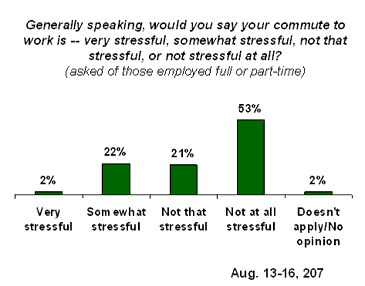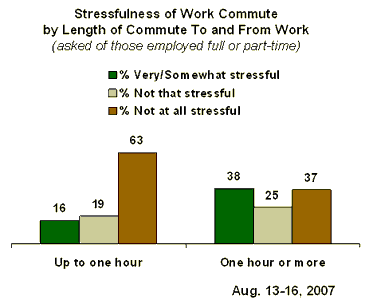GALLUP NEWS SERVICE
PRINCETON, NJ -- Gallup's annual Work and Education survey finds that American workers report spending an average of 46 minutes commuting to and from work in a typical day. Workers at higher income levels and those who work at least 40 hours per week tend to have longer commutes than others. The vast majority of workers say their commute is not that stressful, but workers who travel at least an hour each day are much more likely than those who travel less than that to say their commute is stressful.
Workers' Work Commute in a Typical Day
According to the Aug. 13-16, 2007 poll, the vast majority of adults employed full or part-time, 85%, say they generally drive themselves to work. Six percent of workers say they usually ride with someone else to work, 4% take mass transportation, and 3% walk.
(Asked of adults who are employed full or part-time) How do you generally get to work -- do you drive yourself, ride with someone else, walk, take mass transportation, or something else?
|
2007 Aug 13-16 |
|
|
% |
|
|
Drive yourself |
85 |
|
Ride with someone else |
6 |
|
Take mass transportation |
4 |
|
Walk |
3 |
|
|
|
|
Something else |
1 |
|
|
|
|
No answer |
* |
|
* = Less than 0.5% |
|
According to the survey, American workers say they spend an average of 45.6 minutes commuting to and from work in a typical day. (This includes workers who report "zero" minutes commuting; excluding these workers yields an average commute time of 48.1 minutes).
The data show that 28% of workers commute less than 30 minutes to and from work, 36% travel between 30 minutes and an hour, 17% commute between one hour and an hour and a half, and 17% travel longer than that in a typical day.
The median commute time is 30 minutes, meaning approximately half of workers spend less than 30 minutes commuting to work and approximately half spend more time than this.
(Asked of adults who are employed full or part-time) How much total time in minutes do you spend commuting to and from work in a typical day?
|
2007 Aug 13-16 |
|
|
% |
|
|
Less than 30 minutes |
28 |
|
30 minutes to less than one hour |
36 |
|
One hour to less than 90 minutes |
17 |
|
90 minutes to less than 2 hours |
9 |
|
2 hours or more |
8 |
|
No answer |
2 |
|
|
|
|
Mean (including zero) |
45.6 mins. |
|
Mean (excluding zero) |
48.1 mins. |
|
Median (including zero) |
30 mins. |
American workers residing in higher income households are more likely to report having a longer round-trip commute to work than workers in lower income households. Workers residing in households earning less than $50,000 per year report an average commute of 40.9 minutes in a typical day. This compares with an average 49.2-minute commute among those earning $50,000 or more per year.
|
Time Spent Commuting To and From Work,
|
||
|
Less than $50,000 |
$50,000
|
|
|
% |
% |
|
|
Less than 30 minutes |
33 |
24 |
|
30 minutes to less than one hour |
35 |
37 |
|
One hour to less than 90 minutes |
19 |
16 |
|
90 minutes to less than 2 hours |
7 |
11 |
|
2 hours or more |
6 |
9 |
|
No answer |
1 |
3 |
|
|
|
|
|
Mean (including zero) |
40.9 mins. |
49.2 mins. |
|
Median (including zero) |
30 mins. |
30 mins. |
Those who work fewer hours per week also report a shorter commute than those who work longer hours each week. Workers putting less than 40 hours on the clock each week travel an average of 34.0 minutes to and from work in a typical day, much lower than the average 48.4 minutes among those who work at least 40 hours each week.
Also, those working more than 40 hours per week (38%) are twice as likely as those working less than a 40-hour week (19%) to commute an hour or more each day to work.
|
Time Spent Commuting To and From Work,
|
||
|
Less than 40 hours per week |
40 hours or more per week |
|
|
% |
% |
|
|
Less than 30 minutes |
37 |
26 |
|
30 minutes to less than one hour |
45 |
34 |
|
One hour to less than 90 minutes |
12 |
19 |
|
90 minutes to less than 2 hours |
1 |
11 |
|
2 hours or more |
6 |
8 |
|
No answer |
-- |
2 |
|
|
|
|
|
Mean (including zero) |
34.0 mins. |
48.4 mins. |
|
Median (including zero) |
30 mins. |
35 mins. |
A Stressful Commute?
The poll also asked American workers to describe the stressfulness of their commute to work. Only about one in four workers say their commute is either "very" (2%) or "somewhat" (22%) stressful, while an additional 21% say it is not that stressful and more than half (53%) say it is not stressful at all.

Although the vast majority of all workers say their commute is either not that stressful or not stressful at all, workers with longer round-trip commutes say they experience much more stress than those with shorter commutes. This may be due to those with longer commutes report traveling more than three times as far as those with shorter commutes.

There are only minor variations in the amount of stress people experience from their work commutes by household income or number of hours worked each week.
Survey Methods
Results are based on telephone interviews with 1,019 national adults, aged 18 and older, conducted Aug. 13-16, 2007. For results based on the total sample of national adults, one can say with 95% confidence that the maximum margin of sampling error is ±3 percentage points. For results based on the sample of 547 adults employed full or part-time, the maximum margin of sampling error is ±4 percentage points. In addition to sampling error, question wording and practical difficulties in conducting surveys can introduce error or bias into the findings of public opinion polls.
